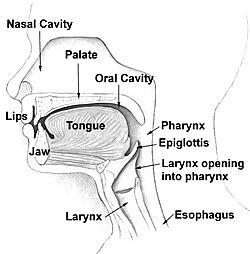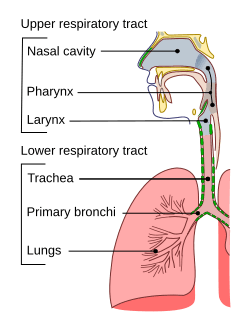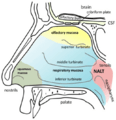Nasal cavity facts for kids
Quick facts for kids Nasal cavity |
|
|---|---|
 |
|
| Head and neck. | |
 |
|
| Conducting passages | |
| Latin | cavum nasi; cavitas nasi |
| Gray's | subject #223 994 |
| MeSH | Nasal+Cavity |
The nasal cavity is a big, air-filled space inside your head. It sits right behind your nose, in the middle of your face. It's a very important part of your respiratory system, which helps you breathe.
Contents
How Your Nasal Cavity Helps You Breathe
Your nasal cavity is split into two parts, one for each nostril. It does several important jobs to prepare the air you breathe before it reaches your lungs:
- Warming the air: The walls of your nasal cavity have many tiny blood vessels. The heat from the blood in these vessels warms up the air as you breathe it in.
- Moistening the air: Special cells in the walls of the nasal cavity add small amounts of water to the air. This makes sure the air is moist.
- Cleaning the air: The inside walls of your nasal cavity are covered with tiny hairs called cilia and sticky mucus. These work together to trap dust, pollen, and germs from the air. The cilia then sweep the mucus, along with the trapped particles, towards the back of your throat. You then swallow it, which helps keep your lungs clean and healthy.
All these steps – warming, moistening, and cleaning – make sure the air is just right before it goes down to your lungs.
Where Is Your Nasal Cavity Located?
Your nasal cavity is protected by the bones of your nose. The roof of your mouth forms the floor of your nasal cavity, separating it from your mouth.
Inside the nasal cavity, a wall called the nasal septum divides it into two halves. This septum runs vertically down the middle. On the sides of the nasal cavity, there are three bony shelves called turbinates. These turbinates help guide the air as it flows through the cavity, making sure it gets warmed, moistened, and cleaned properly.
Images for kids
See also
 In Spanish: Fosa nasal para niños
In Spanish: Fosa nasal para niños
 | Anna J. Cooper |
 | Mary McLeod Bethune |
 | Lillie Mae Bradford |


